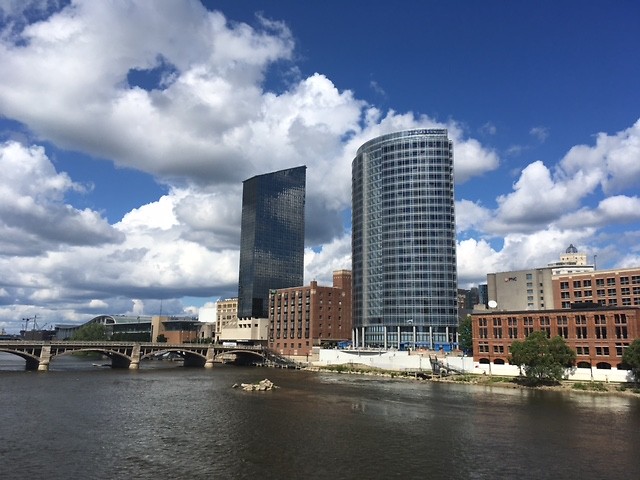Fred Wooden, the senior pastor of Fountain Street Church, responds:
“The Torah speaks of cities of refuge, for those who are not safe despite the usual safeguards. They served a needed purpose. Modern houses of worship are not legal sanctuaries. Should they be? I say no. We still need such refuges but legal status would force them into a quasi judicial role in secular society, deciding who is worth protecting and who is not. It is better that houses of worship risk themselves as the refugees risk themselves. The only power houses of worship have these days is as a critic of injustice, and offering sanctuary these days is always a statement about justice delayed or denied. Sanctuary rests upon moral sanctity.”
Fred Stella, the Pracharak (Outreach Minister) for the West Michigan Hindu Temple, responds:
“The Sanctuary movement, as we know it today, has its roots in ancient Judaism. To my understanding there in nothing comparable in Hinduism; but I cannot find a reason why a temple could not offer such shelter. I laud those who offer compassionate lodgings to those who may find themselves in a difficult situation. The question includes different categories so we must treat each one differently. While it is true that people living here without permission are doing so illegally we cannot in good faith lump them all together. There is a considerable difference between a family who, with great personal risk, entered the U.S. to escape extreme poverty or gang violence and a drug dealer. If, during time spent in a church actions are taken to help a family stay here legally then it is a noble gesture indeed.
“So what about others who may have broken other laws against persons or property? In most cases I would not support such harboring. I am not aware of this happening, though. As to victims of domestic abuse, by all means. This could put a house of worship at risk if the abuser should attempt an attack. I would suspect that the congregation might wish to move the victims to a shelter that is well trained in protecting both staff and residents.”
Father Kevin Niehoff, O.P., a Dominican priest who serves as Adjutant Judicial Vicar, Diocese of Grand Rapids, responds:
“First let us define terms. Safe refuge in Catholic parlance means sanctuary. Sanctuary, in this context, is ‘a place giving protection to those fleeing from justice or persecution; or, the privilege of taking refuge in such consecrated place’ (http://www.catholic.org/encyclopedia/view.php?id=10430).
“Sanctuary from persecution or abuse ought to be for the protection of souls. The most appropriate place for such refuge may be a Church. A Church is where one typically finds a sanctuary or holy place.
“The seeking of refuge is reasonable until the threat ceases. If someone has committed a crime, limiting the amount of time he or she may seek such protection is reasonable (historically this was thirty-to-forty days).
“The above Catholic Christian concept parallels the first paragraph of the Constitution for the United States, which reads, “WE THE PEOPLE of the United States, to form a more perfect Union, establish Justice, insure domestic Tranquility and our Posterity, do ordain and establish this Constitution for the United States of America” (http://constitutionus.com/).”
Ty Silzer, a former pastor in the Presbyterian Church in America who attends Mars Hill Bible Church, responds:
“Some will misread the following words as advocating protecting crime. Please understand, crime’s definitions change over time; evil’s does not. The biblical imperative is to renounce evil and protect life.
“Six of forty-eight Levitical cities were known as the ‘Cities of Refuge;’ if you found yourself on the wrong side of a situation and in fear of your life, you could flee to one these cities for the rest of your days (Numbers 35, Deuteronomy 4, Joshua 20).
“God’s people often find themselves state criminals, such as David and Elijah, who both fled from those in power, and end up relying on people who claimed to be and to not be, God’s. One could argue Moses (a murderer) led a criminal nation (in Egypt’s eyes) out of Egypt’s borders. Millennia later, Egypt safeguarded our Infant Savior for the crime of being born male. Just days after himself being on a Christian-murder spree, Christians living in Damascus (Acts 9) snuck Paul, the second greatest contributor to the New Testament, out of the city to save his life.
“This principle isn’t just right for religious buildings, but for good and upright peoples, everywhere. Aren’t they, not the building, the church? The God of the oppressed is not worshipped in buildings and with songs, but by how His people care for any on the underside of power.”
This column answers questions of Ethics and Religion by submitting them to a multi-faith panel of spiritual leaders in the Grand Rapids area. We’d love to hear about the ordinary ethical questions that come up on the course of your day as well as any questions of religion that you’ve wondered about. Tell us how you resolved an ethical dilemma and see how members of the Ethics and Religion Talk panel would have handled the same situation. Please send your questions to [email protected].
The Rapidian, a program of the 501(c)3 nonprofit Community Media Center, relies on the community’s support to help cover the cost of training reporters and publishing content.
We need your help.
If each of our readers and content creators who values this community platform help support its creation and maintenance, The Rapidian can continue to educate and facilitate a conversation around issues for years to come.
Please support The Rapidian and make a contribution today.
